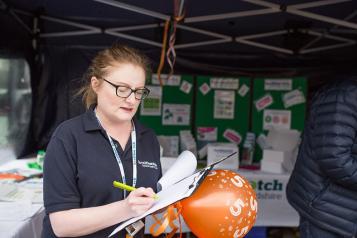Raising the profile of Chagas disease amongst Haringey's Latin American population
Dr Natalie Elkheir is a Clinical Research Fellow at the London School of Hygiene and Tropical Medicine and the Hospital for Tropical Diseases at UCLH. Her research aims to understand the epidemiology of Chagas disease among Latin American migrants in London, with a view to informing an effective and equitable screening programme. She sat down with Healthwatch Haringey’s policy and research officer Emily Arama Sánchez.
Chagas disease is common in parts of Latin America despite the fact that not many people have heard about it here in the UK. The disease is caused by a parasite called Trypanosoma cruzi and that parasite is mainly spread by bugs in Latin America that live in rural areas.
One third of people infected with the parasite go on to develop heart or gut disease, usually decades after initial infection. Chagas is often described as a silent killer due to its tendency to cause advanced heart disease before symptoms appear. It affects seven million people worldwide and causes 12,000 deaths annually.
Treatment is possible but in the UK there's uneven access to testing for Chagas disease, a simple blood test. Dr Elkheir explained:
There is a health inequality issue in the UK, because in some communities, for example, people who grew up in rural parts of Bolivia, Chagas disease is very common and prevalence amongst Bolivians here could be around 15%, comparable with diabetes or cancer.
Barriers
There are many barriers to people getting screened for Chagas disease. Most hospitals in London can request the test, but many GP practices can't request it on their system. Dr Elkheir talked about the lack of awareness:
A comprehensive screening programme is needed:
Language barriers are a big issue too. Even though interpreters should be available to GPs, awareness is low and patients can find an interpreter quite difficult to arrange.
Another issue is stigma. Chagas historically has been a disease linked with poverty because it is most common in rural impoverished parts of Latin America and so there is some stigma surrounding this disease and people may not wish to recognise their risk because of that association with poverty.
Profile
Dr Natalie Elkheir is a Clinical Research Fellow at the London School of Hygiene and Tropical Medicine and the Hospital for Tropical Diseases, UCLH. Her PhD has aimed to understand the epidemiology of Chagas disease among Latin American migrants in London, with a view to informing an effective and equitable screening programme. She holds grants from the Medical Research Council, ESCMID, HTD Charitable Fund and LSHTM for work related to Chagas disease.
Information about Chagas disease
UK Chagas Hub | UCLH | Chagas disease treatment and research
information resources for healthcare professionals
English and Spanish information leaflets
Get a blood test for Chagas disease
Anyone born in Central America, South America or Mexico can get a one-off blood test for Chagas disease. Tests can be requested through the GP, or through a charity called IRMO in South London who are working with Dr Elkheir to offer free tests in the community.


